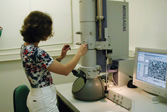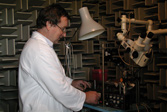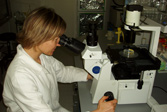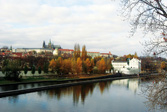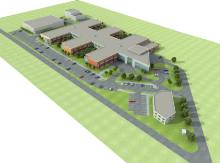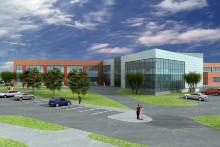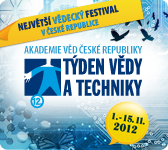Institute of Experimental Medicine AS CR, v. v. i. › Institute › EU Structural Funds Projects › Running Projects
Biotechnology and Biomedicine Centre of the Academy of Sciences and Charles University in Vestec
The Academy of Sciences of the Czech Republic and Charles University in Prague have joined forces to develop a European Centre of Excellence in the field of life sciences. By 2015, when fully operational, the BIOCEV centre will offer state-of-the-art core facilities, contractual research, education and training programmes for students and business specialists and over 400 employment opportunities for scientists from all over the world. All of its five research programmes are being developed by the most prominent scientists from the Czech Republic and abroad. Duration 2010-2014
Project vision
BIOCEV’s vision is to establish a centre of excellence as part of
the European Research Area and to guarantee development of modern biotechnologies and biomedicine in favour of scientific progress and modern
society.
The uniqueness of the project lies in well-balanced activities and goals set within the
pillars of the knowledge triangle, in BIOCEV supported by modern infrastructure and novel
approaches to conducting research, which is based on the experience of top-quality world research
institutes.
The pillars of the knowledge triangle
Top-class research developing the scientific excellence, knowledge transfer through intensive
co-operation with the commercial sector, and education of students and company specialists – these
are the three pillars of the knowledge triangle, which represent the basic essence of the project
BIOCEV.
Research and development
• common project of leading scientific
institutions in the Czech Republic
• research programmes led by the most prominent
scientists
• focus on recently fast developing biotechnology
and biomedicine branches with worldwide impact
• establishment of a centre with complex research
technologies
• integration into the European Research
Area
Transfer of research results into practice
• support of transfer of basic research results
into practice, namely in human and veterinary medicine
• intensive cooperation with the commercial
sphere
• support of preservation of intellectual property
and its further utilization (establishment of a special department for transfer of technologies
whose aim will be both to preserve the research results of BIOCEV scientists and to maximize their
socioeconomic contribution)
Teaching and education
• education of Master and PhD students in a
stimulating environment of leading scientific teams
• development of new study specializations
• education of professionals in the business
sphere
• popularization of the areas of biotechnology and
biomedicine and their promotion in the media
Scientific programme
BIOCEV scientific programme is focused on the key challenges and latest trends in
biotechnology and biomedicine research. High complementarity and synergy of all parts of the research concept of BIOCEV are the
guarantee that BIOCEV will become a significant crossroads of science in the heart of Europe, with
considerable potential impact on human knowledge and its transfer into practical life, and on
essential areas of human life such as health or environment. The quality of five research programmes stems from the intellectual potential and originality of the strictly
selected research teams as well as the establishment of the state-of-the-art core
facilities.
1.
Functional Genomics – will focus at characterization of the complex gene functions including
their interaction, namely on the molecular mechanisms of diseases.
2.
Cellular Biology and Virology – will study interplay between cancer and viral infections,
regulation mechanisms of transformed and stem cells and mechanisms of host-pathogen
interactions.
3.
Structural Biology and Protein Engineering – is programme focused on development and
production of recombinant proteins with practical utilization (e.g. preparation of drugs targeted
to pathologically affected regions of the organism)
4.
Biomaterials and Tissue Engineering – will concentrate on development of synthetic polymer
therapeutics and diagnostic tools and development of polymer materials for tissue replacement in
regenerative medicine.
5.
Development of Therapeutic and Diagnostic Approaches – represents study of the molecular
mechanisms of diseases aimed at the improvement of diagnostics and gaining knowledge on the data
that could be used in further studies of treatment modalities.
The
Institute of Experimental Medicine of the ASCR, v. v. i. actively
participates in the implementation of research projects within programme Biomaterials and Tissue
Engineering.
The application of stem cells for tissue replacements and cell therapy is based on the work of
prof. Eva Syková group.
Core Facilities
Implementation of the complex projects requires cutting-edge technologies. BIOCEV Core
Facilities (central laboratories) will also serve to external users to provide them with top quality research services.
·
Czech Centre for Phenogenomics – centre for functional analysis of individual genes
·
Centre for Molecular Structure – crystallography and mass spectrometry
·
Imaging Methods – microscopic techniques including confocal and electron microscopy
·
OMICS – DNA sequencing and characterization including microchip and proteomic analysis
·
Cryotechnologies
– fully computerised storage for cell lines, mouse sperm, and embryos in liquid nitrogen or
nitrogen vapour
The high quality of BIOCEV research programme is also proved by an early engagement of BIOCEV
research and its core facilities into the significant European Consortia.Since December 2009, BIOCEV is a member of pan-European network of research infrastructures
Infrafrontier, in 2010 it entered consortium Euro-BioImaging and since 2011, the entry to European
infrastructure Instruct is being prepared. All infrastructures are part of the European Strategic
Forum for Research Infrastructures
.
The new research centre BIOCEV will be built on the estate of the Institute of Molecular
Genetics, v. v. i., in the industrial part of Central Bohemian village Vestec. The area of the land
defined for the construction of the centre is 5.5 ha. The total surface area of the modern
laboratories will reach 25,500 m2 by 2014.
More informations:
Scientific coordinator of project:
prof. RNDr. Václav Pačes, DrSc.
tel.: +420 241 063 541
email: vaclav.paces@img.cas.cz
prof. RNDr. Václav Pačes, DrSc.
tel.: +420 241 063 541
email: vaclav.paces@img.cas.cz
Manager of project:
Manager of IEM ASCR:
prof. MUDr. Josef Syka, DrSc.
tel.: +420 241 062 700
email:
syka@biomed.cas.cz
4 Mar 2012







